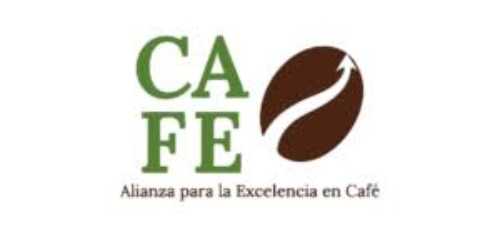LIMA – As it concludes seven years of implementation in Peru, the Coffee Alliance for Excellence (CAFE) has received recognition from two prestigious awards. On October 4th, it won in two categories–Prosperity and Partnership–at the Peru for the SDGs (Perú por los ODS) Awards, which celebrate initiatives that contribute to the country’s development. On October 3rd, CAFE’s innovation to treat coffee wastewater was presented as a finalist at the Swiss Coffee Trade Association’s Next Gen Sustainability Awards.
The recognition comes as the project, an initiative of USAID Peru implemented by TechnoServe with support from JDE Peet’s, shared its final results.
“We are honored that CAFE has received these distinctions,” said Sergio López, director of the project. “However, for CAFE and its partners, the greatest legacy of this initiative will be its lasting impact in making the coffee value chain in Peru more prosperous, regenerative, and inclusive.”
Carried out in the regions of Huánuco, San Martín, and Ucayali, the project has improved the incomes of thousands of coffee-growing families by integrating farmers into sustainable markets and promoting innovative practices that meet high environmental standards.
Since launching seven years ago, CAFE has:
- Benefited more than 14,000 people
- Increased farmers’ incomes by 206%
- Improved coffee yields by 81%
- Mobilized $44.8 million in financing
- Facilitated $140 million in coffee sales.
- Strategic Partnerships and Sustainability
CAFE worked closely with key actors from the public and private sectors, such as the Peruvian anti-drug agency DEVIDA, Promperú, Rainforest Alliance, and the Peruvian Coffee and Cocoa Chamber. These partnerships strengthened producer organizations’ management and promoted Peruvian coffee both nationally and internationally.
CAFE also collaborated with Root Capital and the Peruvian development bank COFIDE to create credit-and-savings unions (UNICAs) in the Peruvian Amazon, mobilizing more than $2 million in savings, loans, and interest for farming families with limited access to traditional finance.
Supporting regenerative agriculture
The program made important strides in helping farmers transition to regenerative coffee production:
- 95% of participating farmers implemented regenerative practices
- 5,787 obtained sustainable certifications
- More than 12,000 hectares of coffee were planted under sustainable agroforestry systems
- 130 million liters of wastewater were treated through 3,265 vetiver grass filtration ponds
- Between 2022 and 2024 alone, the program helped farmers avoid 1,283 metric tons of carbon emissions.
Impact on women and youth
The project prioritized supporting women’s economic empowerment and the participation of young adults in the coffee value chain. Women saw a 347% increase in their incomes, and the income gap between men and women was reduced by 21%. Additionally, nearly 600 young people were trained in coffee tasting and barista skills, improving their opportunities in the coffee labor market.
Since 2022, JDE Peet’s and CAFE have worked with 2,000 families to eliminate child labor in agriculture, while the Starbucks Foundation has partnered with CAFE to empower 1,300 women in their social and economic development.
Innovation and advances in research
One of the key pillars of Alianza CAFÉ was applied research, which enabled farmers to adopt new technologies and improve their agricultural practices. In collaboration with World Coffee Research, the project evaluated coffee varieties for their potential; These findings were instrumental in establishing seedbeds with high productive potential.
Additionally, in collaboration with the International Potato Center, satellite images were used for remote sensing of nutritional stress in coffee fields, helping farmers to more efficiently use fertilizers and water.
About TechnoServe
Founded in 1968, TechnoServe is a leader in harnessing the power of the private sector to help people lift themselves out of poverty for good. A non-profit organization working in around 35 countries, they work with people to build a better future through regenerative farms, businesses, and markets that increase incomes.
Their vision is a sustainable world where all people in low-income communities have the opportunity to prosper.


















